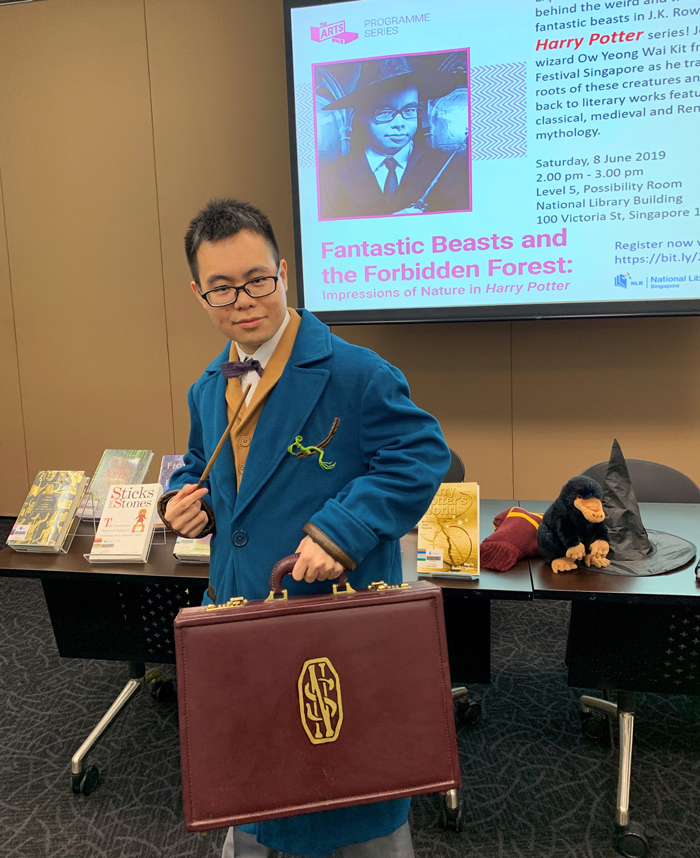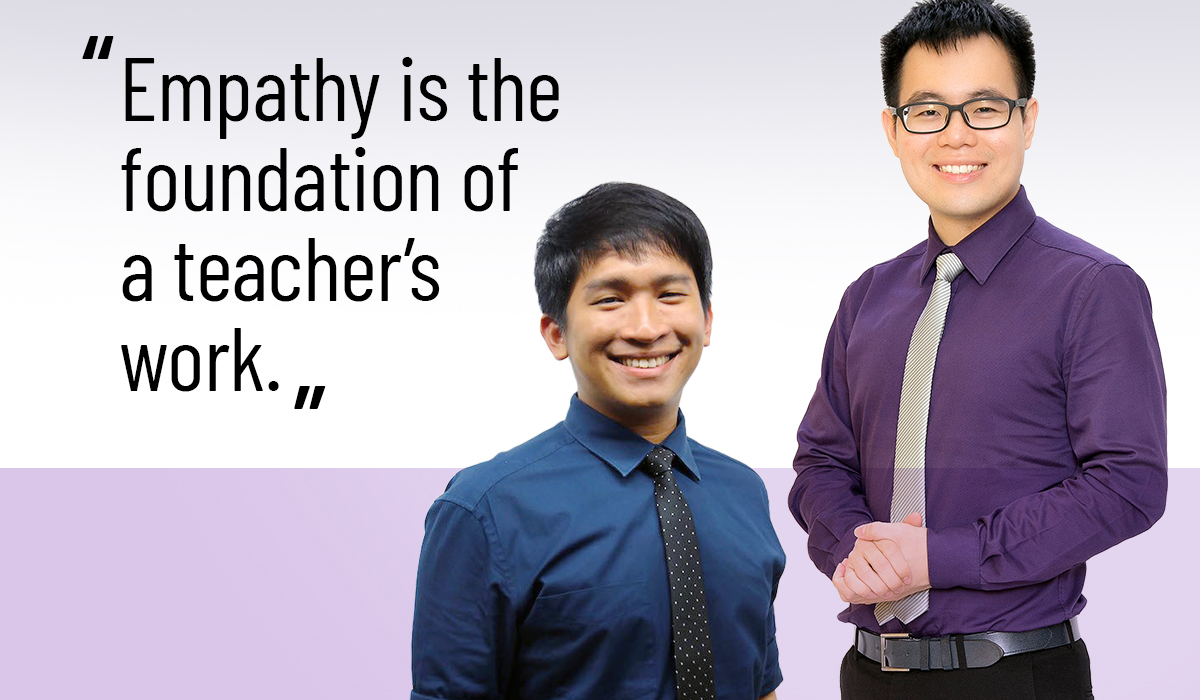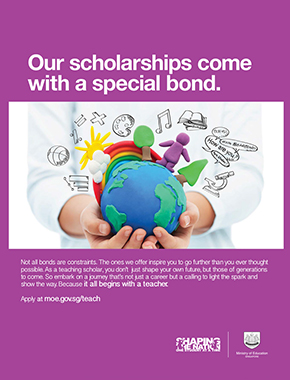Left: Roy Lee Lian Hui is responsible for lower-secondary student development and student engagement as an Assistant Year Head (Lower Secondary). He is an MOE Teaching Scholar, and holds a Bachelor of Arts in Chinese (Hons II) (Chinese Literature) from Nanyang Technological University.
Right: Ow Yeong Wai Kit supports professional development in the teaching service as an Academy Officer in the Academy of Singapore Teachers’ Professional Development Branch 2. He is a recipient of the MOE Teaching Scholarship and MOE Masters Sponsorship. Wai Kit holds a Bachelor of Arts (Hons I) in English Literature from National University of Singapore, and a Masters of Arts in English Literature from University College London.
Education is a passport for the future, and the mission of the Ministry of Education (MOE) is to compile and stamp those passports for each and every student. Ow Yeong Wai Kit and Roy Lee Lian Hui, MOE Teaching Scholars, each play a different role in developing students, and their teachers, to their full potential.
To wit, Ow Yeong Wai Kit is an Academy Officer in the Academy of Singapore Teachers’ Professional Development Branch 2, who supports professional development in the teaching service.
On the other hand, Roy Lee Lian Hui is an Assistant Year Head (Lower Secondary). He is responsible for student development and the well-being of lower secondary students.
Together, they paint a picture of the multi-faceted work that goes into fostering the next generation of Singaporeans, and the vital lessons they have learnt beyond the classroom.
How did both of you develop a passion for education and teaching?
Wai Kit: Both my parents were working in the education sector. So for the longest time, I resisted joining the education service: I didn’t want to join just because the rest of the family was already in it.
But after many conversations with my own school teachers, professors, and mentors, I realised that my skills and interests lay in the field of education, and specifically language and literature.
Roy Lee: Teaching has been a dream of mine ever since I was a child. I have had countless outstanding teachers who gave me good guidance over my schooling years and that has inspired me to do the same for others.
I believe that education is an important social process. A committed teacher can make a huge difference to the lives of others.
Both of you took on the MOE Scholarship. From your perspective, why should students pursue a scholarship?
Wai Kit: I would suggest that the primary motivation of seeking a scholarship should be the desire to serve the organisation that offers the scholarship;: this means that the organisation’s mission and values should align with one’s own.
Roy Lee: The MOE is intentional in exposing scholars to a wide repertoire of experiences that could give them insight into the teaching career.
A scholarship will provide scholars with this widened perspective of an educator’s role in Singapore.
So, how did you discover the MOE Scholarship?
Wai Kit: I came across an MOE advertisement in the BrightSparks magazine. Now that I’ve been asked by BrightSparks about my experience, it is as if things have come full circle!
Roy Lee: I believe I chanced upon it in the Brightsparks magazine as well, and corroborated my findings with content from the MOE Teaching Scholarship webpage back then.
What was the defining factor that made you apply for the scholarship?
Wai Kit: The defining factor would have to be the conversations that I had with MOE scholars as well as my teachers and professors. I didn’t want to make a hasty decision, so I asked for their opinions and thoughts about whether I should apply.
A professor at the NUS University Scholars Programme (USP) suggested that I conduct a Cost-Benefit Analysis in a table format. I did, and I realised that it made a lot of sense to apply for the scholarship.
Roy Lee: When I applied for the scholarship, I knew that I was committed to teaching as a career. Hence, I felt that this could be the right fit for me. I also understood that the scholarship would be able to alleviate financial stress from my family.

Bringing Literature to Life
Wai Kit shared that during his literature lessons, he often cosplays as characters from literature texts. He also plays literature-inspired card games with his students, which helps them to become self-directed learners.
Wai Kit, you studied English Literature in National University of Singapore and University College London. What was your biggest takeaway during your university days?
Wai Kit: It would have been the sheer exposure to diverse experiences offered by my university, and in particular, the NUS University Scholars Programme (USP). Even as an English Literature major, I had the opportunity to learn about topics ranging from Darwin’s evolutionary theories to new business models.
Beyond the classroom, I also went overseas for the international programmes that USP offered. I became comfortable with venturing overseas to diverse locations, which led me to pursue my master’s degree at University College London.
As for Roy, you pursued Chinese.
Roy: Indeed. I majored in Chinese at Nanyang Technological University’s School of Humanities and Social Science. The course allowed me to have a deeper understanding of Chinese language, culture, literature and history.
My specialisation in Chinese literature has allowed me the opportunity to read a variety of Chinese texts, from ancient classics to contemporary selections. These stories and books have helped me understand the importance of having empathy and to analyse social phenomena from multiple angles.
More importantly, how did you apply what you have learnt to your current work?
Wai Kit: I learnt that I should always question my assumptions, but also never give up despite setbacks, and that I should seek continuous improvement. These are principles that I have brought into my teaching, as well as my current work at MOE HQ. It’s fitting that my work now focuses on teachers’ professional development, which aligns with my passion for skills renewal and improvement.
Roy: Empathy is the foundation of a teacher’s work. Our students come from a range of backgrounds and each of them carries their own stories when they come to school.
I approach each student with the sincerity and honesty I have learnt. It helps me to connect with them on a personal level.
What possibilities are there for scholars working at your organisation?
Wai Kit: A whole range of opportunities await MOE scholars!
Postings to schools would be the most evident opportunity, with a wide variety of possible schools where one could be sent. Scholars may also get the opportunity to serve at MOE HQ, where they may be involved in HQ-level policy work.
Whether serving at HQ or in schools, MOE scholars can look forward to rich learning opportunities not only to refine their own skills, but also to shape our future generations in bold and exciting ways.
Roy: Scholars can look forward to developing lesson ideas for their subject areas that could enhance the joy of learning in our students.
They could also be exposed to a variety of experiences such as student management and designing of Character and Citizenship Education lesson packages.
What advice would you give to aspiring scholars looking to join the teaching profession?
Wai Kit: Early on, I realised that the more organised I became, the better I would be at my job, and the more time I could devote to new activities and projects for students. Most teaching anxieties can be eliminated simply by being organised.
I would also advise first-time teachers to be like a magpie: collect and document everything. If possible, they should retain resources in soft copy so that they can be retrieved more easily. They’ll thank themselves in the future.
Roy: I would encourage all aspiring scholars to speak to the educators who have impacted them. They are the best human resource that we have.


